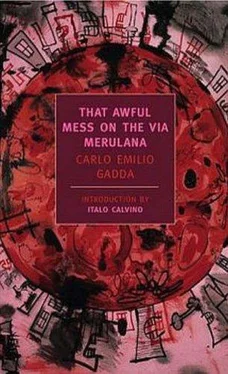March the 23rd, in the carabinieri's barracks, at Marino. Having risen in the night, come down at daybreak, a private was waiting in the courtyard. Pestalozzi appeared, a dark person, from the shadows, from beneath the archway: he walked to his machine: his bandoleer stood out, white, to underline the dispatch of his actions in an elegant apparatus of authority. A few words to the subaltern, a brief inspection of the beast, splashed with mud up to its muzzle. Once he in the saddle, with one foot on the ground, the left, he gave the kick to the motor: with his right. The sentry had opened the doors, as if for the exit of a great coach, of some Roman Apostolic Prince and Duke of Marino. Pestalozzi seemed lost in thought. Wednesday the 23rd, he thought. In fact. He raised his eyes to the tower, which a spout of almost-yellow light, from a screened bulb, tinged at its top, in a stripe, a little below the surviving roughness of the cordon at the pinnacle. Six twenty-five by the clock in the tower: the same as his own, exactly. To accompany him he had summoned this private, who was already weighing down the rear part of the seat with his behind and was about to draw his feet into the boat, too, clasping his superior by the waist, with both hands, and awaiting the motor's first explosion. Pestalozzi with his right foot, pressed down: he reiterated the starter. The cylinder began at last to gurgle, the whole machine to tremble, to beat its wings. The sentry saluted, at attention: the threshold was passed. The turn did not occasion falls. But they weighed, the two of them, on the tires. The cobbles were slippery, a steep slope: a little skin of mire, in some places, made it even more dangerous. The mare with the two riders on her withers rolled down, under restraint, grumbling, it bore to the right, then to the left towards the gate of the town, between black peperino walls and shadows, beneath little square windows, armed with rusty iron bars to incarcerate the darkness. An occasional civic lamp swayed its greeting to the fleeting men, in that dark and stony poverty of the village: a bracket coming from the lichened walls, which sloped back, like the curtains of a fort: electric flower of the willing budgets, ultimate sob from the bowels of the vice-mayor for the ante-lucan solitude of a street from which the north wind precipitates, whistling, at night: or the sirocco slows there and dies, three nights later. They descended to the gate of the town.
Once past the arch, the road started spreading out towards the Appian: it went among olive groves barely silvered by the dawn and the prone skeletons of vines in the vineyards. Then it was thrown back, like a stole, over the damp shoulders of the hill. At the first curve the view also turned back.
Pestalozzi raised his head for a moment, cut the motor, put on the brake, stopped their course, with a certain caution: he paused for a couple of minutes, to cast the morning's horoscope.
It was dawn, even later. The peaks of the Algido, the Carseolani and the Velini unexpectedly present, gray. Sor-atte, sudden magic, like a fortress of lead, of ash. Beyond the passes of Sabina, through small openings, portholes that interrupted the line of the mountain's crest, the sky's revival manifested itself in the distance by thin stripes of purple and more remote and fiery dots and splendors of sulphur yellow, of vermilion: strange lacquers: a noble glow, as if from a crucible of the depths. The north wind of the day before had died away, and here, to alternate the auguries, the hot slavering on skin and face, the gratuitous and now subsiding breath of a sirocco's lashing. Further on, from behind Tivoli and Carsoli, flotillas of horizontal clouds, all curled with cirrus, with false ribbons of saffron, hurled themselves, one after the other, into battle, filed joyously towards their shredding: whither? where? who knows? but surely where their admiral ordered them, to get it in the neck, as ours orders us, all their little sails within the range of the winds. Labile, changing galleys, tacked at a high, unreal height, in that kind of overturned dream which is our perception, after waking at dawn, tacked along the ashen cliffs of the mountains of the Equi, the whitened nakedness of the Velino, the forewall of the Marsica. Their journey resumed, the driver obeyed the road, the machine addressed the curves, bending with the two men. The opposite half of the weather there, above the shore of Fiumicino and Ladispoli, was a brown-colored flock, shading into certain leaden bruises: gravied sheep pressed, compact, meshed in the ass by their dog, the wind, the one that turns the sky rainy. A roll of thunder, rummm, son-of-a-gun! had the nerve to raise its voice, too: on March the 23rd!
The sergeant pressed down with his foot, accelerating towards the fountain. From the right, where the plain was dense with dwellings and went down to the river, Rome appeared, lying as if on a map or a scale model: it smoked slightly, at Porta San Paolo: a clear proximity of infinite thoughts and palaces, which the north wind had cleansed, which the tepid succession of sirocco had, after a few hours, with its habitual knavishness, resolved in easy images and had gently washed. The cupola of mother-of-pearl: other domes, towers: dark clumps of pines. Here ashen: there all pink and white, confirmation veils: sugar in a haute pate, a morning painting by Scialoja. It looked like a huge clock flattened on to the ground, which the chain of the Claudian aqueduct bound. . joined… to the mysterious springs of the dream. There, stood the general H.Q. of the force: there, there, for many moons, his dreamed-of application lay waiting, waiting. Like pears, medlars, even an application's ripening is marked by that capacity for perfectable maceration which the capital of the ex-kingdom confers on all paper, is commensurate with an unrevolving time, but internal to the paper and its relative stamps, a period of incubation and of Roman softening. Bedecked, with silent dust, are all the red tapes, the dossiers of the files: with heavy cobwebs, all the great boxes of time: of the incubating time, Roma doma; Rome tames. Rome broods. On the haystack of her decrees. A day comes, at last, when the egg of the longed-for promulgation drops at last from her viscera, from the sewer of the decretal labyrinth: and the respective rescript, which licenses the gaunt petitioner to scramble that egg for the rest of his natural life, is whipped off to the addressee. In more cases than one, it arrives along with the Extreme Unction. It licenses the applicant, now sunk into coma— verba volant, scripta manent —to practice that sleeping art, that crippled trade that he had surreptitiously practiced until then, till the moment of the Holy Oil: and which from then on, de jure decreto, he will make an effort to practice, a little at a time, in hell with all the leisure granted him by eternity.
The sergeant sped downhill towards I Due Santi. It was a sultry day, the mugginess seemed to have drunk the swamps. But the wind of their speeding and an occasional rare drop, like a musket ball in the face, presaged the alacrity of their investigation, and the fecund interviews in the useful hours of the morning. Sounding the horn at a gander, which lingered to duck its ass in the road, he ripped a half-curse from his teeth: it was at that moment that there came to his mind, in a flash, haunted by his wakening at this early hour, the endless dream of the night before.
He had seen in his sleep, or had dreamed. . what the hell had he managed to dream of?… a strange being, a topass: a topase. He had dreamed of a topaz: what is, after all, a topaz? a faceted glass, a kind of yellow stop light, which grew, and was enlarged from one moment to the next until it promptly became a sunflower, a malign disk that escaped him, rolling forward, almost beneath the wheel of the bike, in mute magic. The Marchesa wanted it, the topaz; she was drunk, yelling and threatening, stamping her feet, her face estranged in a pallor as she uttered obscenities in Venetian, or in some Spanish dialect, more likely. She had raised hell with General Rebaudengo because his carabinieri weren't bright enough to overtake it on any road, or path, the awful topaz, that yellow glass. So at the railroad crossing of Casal Bruciato, the glass sunflower… by the right flank, march! It had fled along the rails, changing its form into a yellow rat and snickering top-as-ass-ass: and the Rome-Naples express raced on and on, full speed after the sunset and almost already into the night, into the Circean darkness, diademed with flashes and spectral sparks on the pantograph, luminous stag saturated with electricity. Until, realizing that the mad rolling along the fleeting parallels was not enough to save him, the topaz-ass-rat had turned from the track and had sped into the countryside in the night towards the mouthless ponds of Campo Morto and the underbrush and the thickets of the Pometian shore: the women signal-keepers yelled, shouted that he was mad: they were to stop him, handcuff him: the locomotive chased him through the swamp, with two yellow eyes searching everything, cane brake and the darkness, to that point where place names become sparse, at the foot of the mountain of Contessa Circea, where Japanese lanterns and garlands swayed above the terraces on the shore, in the evening breeze from the sea. Nereids, there, freshly emergent from the waves and immediately denuded of their garments of seaweed and foam, amid the bustle of waiters in white jackets and of damp siphons and fistulas, were wont to make merry the enchanting night of Villa Porca. The Contessa, amid languid dirges, asked for a phial for sleep, for oblivion: for the vain arabesques, the bewilderments of dreams. Of the dream of not being. At Villa Porcina, under festoons of yellow ten-watt pears and drunken balloons, sweetly obese in the breathing and dying of every melody, the sorceress of the (perpetually) open snuffbox elicited at her scent the imminent swine, those who, at that philter, and that perfume, were to turn into snouted pigs, after having become eared-asses at the school: of the machiavellian club's hard knocks. Already the female pupils writhed, stark white except for the thicket triangle, from every austere veto of fathers, they wriggled in silent offering: which, from slow, restrained moorish saraband gradually was exalted to the trochaic rhythm of an estampida, where the resolute beating of the foot bestowed a fierce arsis on the floor: while the prompt erection and the shaking both of neck and head gave their hair back to the abyss, signifying the untamed pride both of the cervix and of the spirit, reiterated by the ta-ta-ta-tum of the castanets. Then as the aggression of the naked (but not for that hebefied) males broke into the chorus, the estampida was exacerbated to a sicinnis, to a dance simultaneously exozcizational: a swarm of frightened and bosomy nymphs pretended to abhor a herd of satyrs, to shield themselves and take shelter both with their hands and in flight towards their rubescent and fumigant thyrsi, already half-dazed, to tell the truth, by their excessive officiating: with their noses. Falling at that point among their legs, like the black thunderbolt of every prompt and every black happening, the crazed topaz had suddenly frightened the beauties. Shards of an exploded heart had flown off in every direction, to every corner, stopping — at the very sight of that possessed sewer rat, their hippy and mammary ritual. And there were shouts and shrills not to be told as the mustachioed one darted here and there like an arrow's notch, black, sharpened meatball. Many of the priestesses, forgetting their nakedness, had made a gesture as if to draw skirts down to their knees, protecting a defenseless delicacy: but the skirts were only a dream. And so was their delicacy.
Читать дальше












